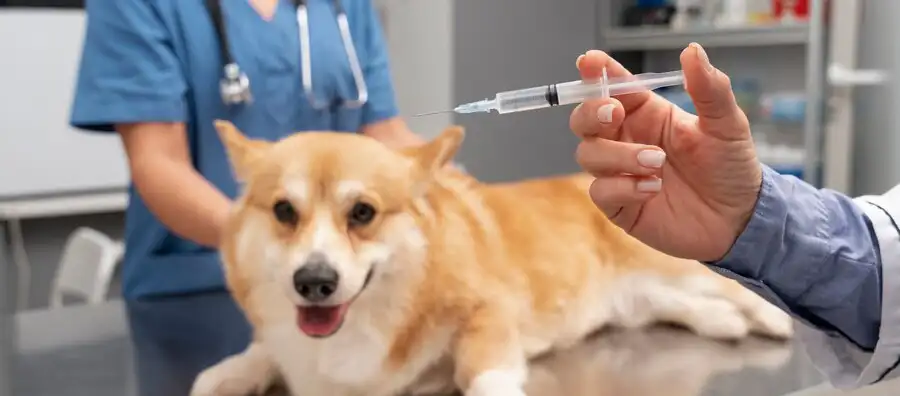
Important Tips for Following Your Dog Vaccination Schedule
When it comes to taking care of your furry friend, ensuring they follow a proper dog vaccination schedule is crucial for their health and wellbeing. Vaccinations play a pivotal role in protecting your dog from various contagious and potentially deadly diseases. In this blog post, we will delve into important tips and essential information you need to know to keep your dog’s vaccinations up to date and ensure they lead a happy, healthy life.
Understanding the Core Vaccines Your Dog Needs
Core vaccines are critical in every dog’s preventive health care regimen. They shield against diseases like Canine Parvovirus, Canine Distemper, Hepatitis, and Rabies, which pose significant risks due to their high contagion rates or severe impact on health.
Beginning in puppyhood, these vaccinations are administered to establish a baseline immunity, which is crucial for a young dog’s developing immune system. As dogs mature, booster shots are necessary at prescribed intervals to maintain this immunity throughout their lives.
The specific timing and frequency of these boosters can vary, influenced by factors such as the type of vaccine used and individual health considerations.
For puppies, the initial doses of these core vaccines are usually started between 6 to 8 weeks of age, highlighting the importance of early protection against these dangerous diseases. Each vaccine targets a specific pathogen and works to prepare the dog’s immune system to fight off potential future infections.
It’s imperative to adhere to the recommended schedule, as deviations could compromise the effectiveness of the vaccine regimen, leaving your pet vulnerable to illnesses. Your dog vet can guide the exact vaccination schedule tailored to your dog’s specific needs, considering any health issues, lifestyle, and potential exposure to disease.
Non-Core Vaccines and Assessing Your Dog’s Needs
Non-core vaccines cater to a more individualized approach to your dog’s health, focusing on the specific risks and lifestyle factors they may encounter. These vaccines are considered optional and include protection against diseases like Bordetella, commonly associated with kennel cough, Lyme disease from tick bites, Leptospirosis from water contaminated by wildlife urine, and Canine Influenza.
The necessity for these vaccinations hinges on several factors, including your dog’s exposure to other animals, the prevalence of certain diseases in your area, and their overall activity level outdoors.
Engaging in a detailed discussion with your veterinarian in north Vancouver is key to determining the relevance of non-core vaccines for your dog. For example, if your furry companion frequently visits dog parks, stays in boarding facilities, or hikes in areas known for ticks, they might be at a higher risk for certain conditions these vaccines prevent.
Your vet can offer insights into the local disease prevalence and help assess your dog’s risk level, ensuring you make informed decisions about their vaccination needs.
It’s also crucial to revisit this assessment periodically, as changes in lifestyle or environment can alter your dog’s risk exposure. Regular check-ups provide an opportunity to adjust their vaccination plan as needed, ensuring they remain protected as they navigate through life’s adventures.

The dog Vaccination Schedule – A Crucial Start
Embarking on the journey of vaccination with your puppy is an essential step in safeguarding their health. The commencement of this regimen is typically at the tender age of 6 to 8 weeks, initiating a series of protective measures against severe illnesses.
Following this initial stage, puppies undergo a sequence of booster shots, spaced approximately 3 to 4 weeks apart, concluding around the age of 16 weeks. This structured timeline is designed to bolster their immune defense against the most prevalent diseases during this formative period of their lives.
Puppies are especially vulnerable as the natural immunity acquired from their mother’s milk gradually diminishes. It’s during this time that establishing a robust foundation of immunity is most critical. Adherence to this meticulously planned schedule is vital.
Missing or postponing even a single vaccination appointment can expose your puppy to unnecessary health risks. This phase in a puppy’s life is not just about building their physical health but also about setting a precedent for a routine of preventive care that will benefit them throughout their life stages.
It’s a proactive approach to ensure they grow into strong, healthy dogs, capable of enjoying life to the fullest without the looming threat of preventable diseases. If you need an emergency vet in this case, you can contact us.
Adult Dog Vaccination Schedule – Maintaining Immunity
Transitioning into adulthood marks a significant change in a dog’s vaccination protocol, primarily aimed at upholding the protective barrier established during their younger years. Core vaccine boosters, essential for continued immunity against diseases such as Rabies, Canine Distemper, and Parvovirus, are generally administered every 1 to 3 years. The exact interval depends on the type of vaccine used, with some modern vaccines offering longer-lasting immunity, thereby extending the time between booster shots.
It’s important to adhere closely to the recommended dog vaccination schedule provided by your veterinarian, as it takes into account local disease prevalence and legal requirements, particularly for rabies vaccinations.
Non-core vaccines, while not mandatory for all dogs, may still play a crucial role in an adult dog’s health regimen, especially for those with specific lifestyle or environmental exposures.
These vaccines are administered based on a risk assessment, with boosters typically given annually to sustain protection against diseases like Lyme disease or Bordetella.
Staying organized with your dog’s vaccination record is vital during this stage. Keeping a detailed log, either digitally or in a physical health passport, ensures you’re on track with booster vaccinations and aids in communicating effectively with your veterinarian.
This organized approach helps in striking a balance between providing essential immunity and avoiding unnecessary vaccinations, contributing to the overall well-being of your dog as they navigates through adulthood.
Preparing Your Dog for Vaccination Day
To make vaccination day as smooth as possible for both you and your furry companion, a few preparatory steps can make a significant difference. Start by confirming that your dog is feeling well. A healthy baseline ensures they’re in the best condition to receive vaccines, as administering vaccinations to a dog that’s under the weather can lead to complications.
It’s equally important to have your dog’s medical and vaccination history on hand. This information is crucial for the veterinarian to review any previous vaccinations and medical interventions, ensuring an informed decision on the day’s procedures.
Familiarizing your dog with the environment of a veterinary clinic and the experience of car rides if not already accustomed can help in reducing anxiety associated with the visit. Use positive reinforcement to associate these experiences with rewards, making the overall process less stressful.
After the vaccination, keep an eye out for your pet’s behavior and physical condition. Minor reactions are normal, but if you notice anything unusual such as excessive lethargy, discomfort, or swelling at the vaccination site, don’t hesitate to contact your veterinarian for advice.
This proactive observation plays a key role in ensuring not only the effectiveness of the vaccines but also the immediate well-being of your dog following their vaccinations.
Dog Vaccination clinic in North Vancouver
The Role of Titer Testing in Vaccination Schedules
Titer testing, an invaluable tool in veterinary medicine, offers a scientific method to evaluate a dog’s immune response to previous vaccinations by measuring the concentration of antibodies in the bloodstream.
This assessment can be especially beneficial in determining whether a dog is adequately protected against specific diseases or if a booster vaccination is indeed necessary.
Integrating titer tests into a dog’s health care plan enables a more personalized approach to vaccination schedules, potentially reducing the frequency of vaccinations without compromising the dog’s immunity.
This tailored strategy is particularly useful for pet owners concerned about over-vaccination and its associated risks. By conducting titer tests, veterinarians can make evidence-based decisions on whether a booster is warranted based on the antibody levels rather than strictly adhering to a standard vaccination schedule.
This not only ensures the dog’s safety but also supports a health-first approach, avoiding unnecessary stress on the animal’s immune system.
It’s important to note that titer testing is most applicable for core vaccines. The decision to use titer testing for non-core vaccines should be based on a detailed discussion with your veterinarian, taking into account factors such as your dog’s lifestyle, health history, and specific risk exposure.
Engaging in this dialogue helps maintain optimal protection against diseases while embracing a customized care strategy for your dog.
Common Questions About Dog Vaccinations Answered
Navigating the world of dog vaccinations can often leave pet owners with numerous questions. One common query is about the safety of vaccines and potential side effects. It’s reassuring to know that vaccines undergo rigorous testing for safety and efficacy before being approved.
Mild reactions, such as slight fever or lethargy, may occur but serious side effects are rare. Another frequent question involves the necessity of vaccinations if a dog predominantly stays indoors. Even primarily indoor dogs can be exposed to viruses and bacteria, making vaccinations crucial for all dogs regardless of their lifestyle.
Owners also inquire about the cost of vaccinations and whether they’re affordable. Veterinary practices vary in pricing, but many offer packages or wellness plans that make vaccinations more budget-friendly. Lastly, the question of how to track vaccination schedules is common.
Many veterinarians provide reminder services, and there are also mobile apps designed to help keep your dog’s health records and vaccination dates organized.
Understanding these aspects can ease concerns and help ensure that your dog receives the necessary protection against preventable diseases, maintaining their health and happiness for years to come.
